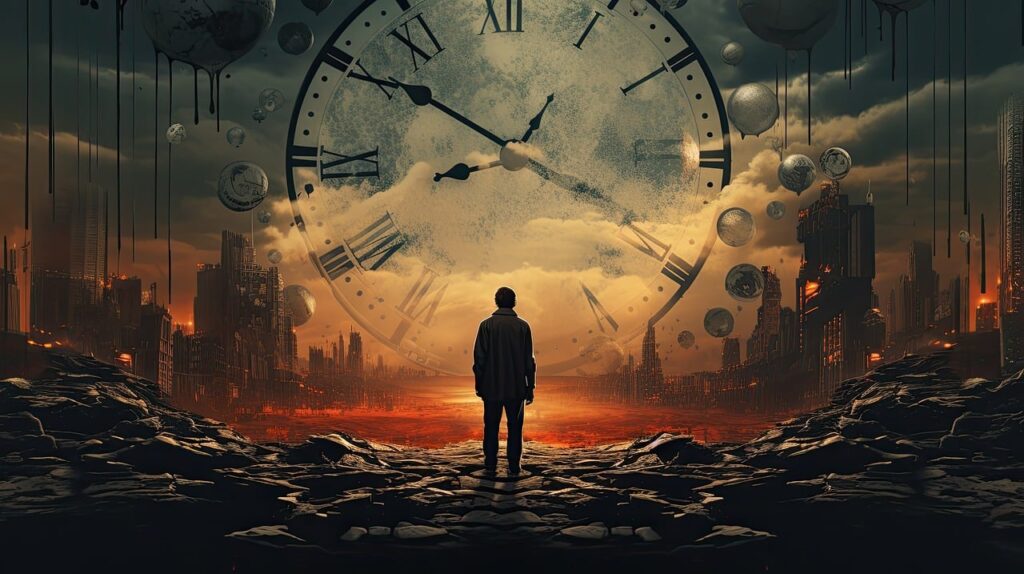
The End of Time
You may think that you exist, and for now, within this tiny slither of time, perhaps you do, but there will come a time when you won’t. And when that moment comes, not only will you cease to exist, but time itself will cease, and in a world without time, there is no time for time itself to have ever existed in the first place.

| The human experience
We have all imagined what it would be like for time to stand still. In fact, for many of us, having the ability to control time in such a way would be a dream come true. We’ve all imagined what it would be like if time really were to cease altogether. We even have idioms for such an eventuality, frozen in time, a state in which all animate objects appear to be trapped in the very position they were in when the clock ticked its final tock.
We intuitively define time, whether consciously or subconsciously, as something that allows change to happen. Without time, how can events occur? How can something fall to the ground? How can we be born, age, even evolve? In fact, ask Wikipedia to define what time is, and the very first sentence will tell you that “Time is the continued sequence of existence and events that occur in an irreversible succession from the past, through the present, into the future.”
We are all intuitively comfortable with the notion of time being the abstract concept in which a continued sequence of events occurs, but we aren’t, perhaps, as familiar with equating time with the continued sequence of existence quite as much. This is why, when asked to demonstrate what the ceasing of time would look like, many intuitively don’t think any further than the state of everything becoming motionless, with change no longer occurring. Very few equate the ceasing of time with the ceasing of existence altogether.
Because, of course, even if ordinarily animate objects become motionless, even down to the quantum level, that stationary state still needs time in which for it to be motionless. Time still passes, regardless of whether change is occurring or not. For as long as something exists, it must exist within time.
So the only way to truly imagine what it would be like if time were to cease would be to imagine non-existence. This would be the non-existence of everything that is affected by time and, considering that time, along with space are fundamental dimensions of the universe itself, it would mean the complete non-existence of the universe.
Before we go on, we must first clarify the difference between non-existence and no longer existing. The former is not associated, in any way whatsoever, with either time or space. The latter, on the other hand, describes something that once existed within space and time, but while the space and time that it existed within continues, it does not.
What I am really asking one to imagine when discussing non-existence is to imagine that which cannot be imagined. As soon as one is asked to imagine nothingness, no matter what form the human brain interprets nothingness to be, it ceases to be nothing. It has been given properties, and therefore, can no longer be nothing.
Let’s imagine for a second that it would be possible to construct a sealed box that is devoid of all matter, all particles, including those that are massless. A box that our human intuition would assume contains the true form of nothingness. Of course, we know that this is scientifically impossible. Quantum particles pop in and out of existence all of the time, and our current understanding seems to suggest that there is no way to prevent this from happening, but let’s imagine that we could. Let’s imagine that we could construct a box that contained absolutely nothing, no mass, no particles, no gravity, no dark matter, nothing whatsoever. The fact is that it would still have the properties of space and time. It would still take up space, and time would continue to flow within it. For to remove those two fundamental properties of the box would be to remove the box, or at least the contents of the box, from existence altogether.
At the risk of veering off the topic too much, it is my understanding that something which contains no space and no time is a black hole, but to discuss this further would give a false impression that I have some scientific qualification, experience, or knowledge in this field, which I do not, and it is not my intention to turn this strict opinion piece into something other than that.

| Subjective time bubbles
Human existence, and as a consequence, human consciousness, could be argued to begin and end with the experience of time passing. The experience of time passing is such a fundamental part of human existence that it is difficult to separate one from the other. Einstein and his theories of relativity show us that the passing of time is relative to our own unique experience of it. That is, time is not a linear process that passes at the same rate for everyone, at all times, everywhere in the universe. We all, to some degree, are living our own, unique versions of time. It is well known that the faster one is moving through space, the faster time passes around you, but for you who are moving at speed, time continues to tick at a normal rate. At the speeds that we move in our day-to-day lives, this difference of time passing is of course negligible, but negligible doesn’t mean it doesn’t exist or is inconsequential. It still has meaning. It shows us that, in a sense, we all exist within our own unique ‘time bubble’ as it were.
This begs the question as to whether time exists for that which cannot experience it. As an example, for things that move at the speed of light, such as a photon, time does not exist. It may take several light years for a photon from a distant star to travel through the vastness of space and enter our eyes, for us to observe it, but for the photon itself, that process happens instantaneously. For the photon, it has no past, no present, and no future, because for the photon to have these properties, it has to have a time for those properties to exist within.
As I sit here taking a sip from my bottle of water, I ask myself if the bottle that I sip from is experiencing time. Of course, it is experiencing entropy. It is slowly moving from order to disorder, a consequence of time passing, but we cannot say that it is capable of experiencing time itself. Only conscious entities can experience time. And not only that, but conscious entities can only ever experience their own unique time. I cannot experience your time any more than you can experience mine. Not only that, but I was unable to experience time before I was conscious enough to observe it, and more to the point of this article, I will be unable to experience my own time when I am no longer able to consciously observe it passing.
We can think of time as two separate entities, both objective and subjective. Objective time is the commonly held belief that time began at the moment of creation, the big bang, it has continued to the present, and will continue, as far as we can tell, into eternity, and for a very brief moment within this objective time, we come into being, we exist, and at some point, we cease to exist.
But this is not really how we experience time on a day-to-day level unless we are forced to think of time in this way. Our everyday experience of time is that of subjective time. While I have no reason to believe that time did not exist before I was consciously capable of experiencing it, I cannot prove this beyond any doubt, and as it was something that existed, and will exist during a time of my own non-existence, I’m left questioning just how relevant this is anyway. Would time exist if I had never been born? We can suggest that objective time may still exist, but we cannot prove this beyond doubt, however, we can say that our own subjective time would not exist. Does time exist for the billions of people who were never given the chance to exist throughout human history?
Does time exist for something that has never existed, and never will exist? No. Because true non-existence includes the non-existence of time itself.
| I think therefore time passes
This leads me to the title of this article: The end of time. When I talk of the end of time, I am not talking about the end of objective time. I am not talking about the end of the universe. I have no idea if time will ever end for the universe or if the universe is infinite in terms of time. Whether time ends or doesn’t end for the universe is not relevant to me and my own existence unless it happens while I am conscious and am able to observe it. If it ever does happen, it will not happen within my own subjective experience of existence, and is therefore, largely of no consequence to me.
No, I am talking about the only time that matters to me: My own subjective time. The time in which I am alive. The time in which I exist. The time in which I am a conscious entity with feelings, emotions, and the ability to experience what it is to be living. In terms of this, time will cease to exist when I am no longer able to experience what it is to be alive. At that moment, my subjective experience of time will cease to exist.
But as I previously discussed, it is not quite as elementary as to say that time has simply ceased. I will no longer have the conscious ability to experience time. I will simply not exist. Time will not freeze for me. There will be no time in which I can freeze. Not only will there be no subjective sequence of events, but there will be no subjective sequence of existence.
And for this to be true, it would also be true that there would be no time in which I would have ever existed in the first place.


